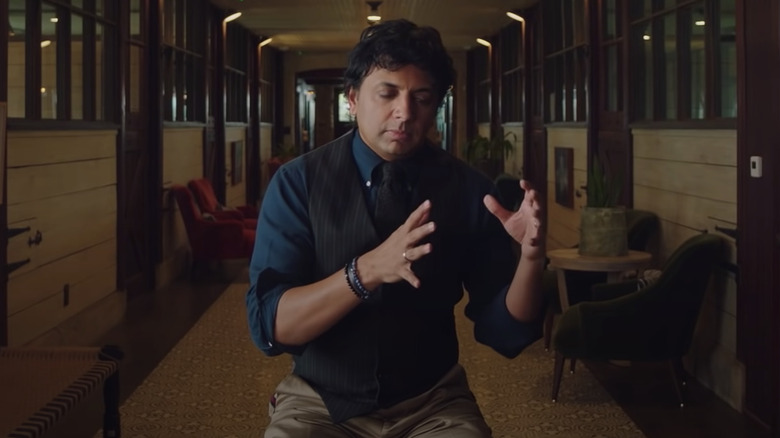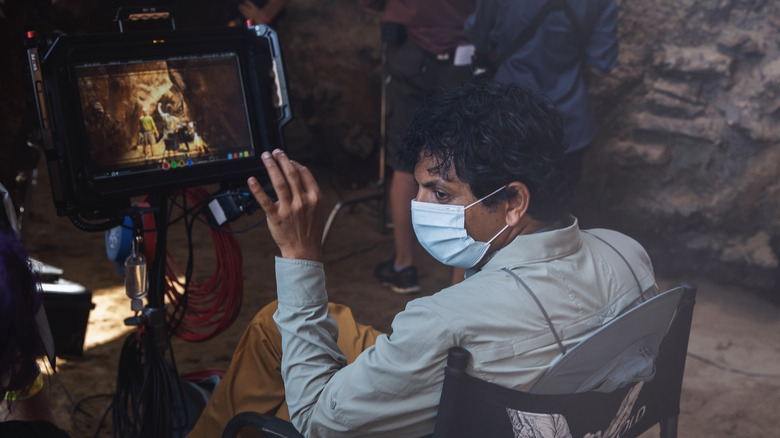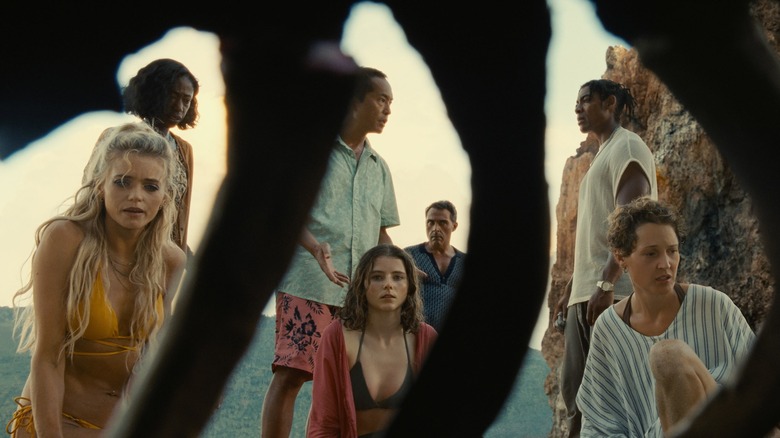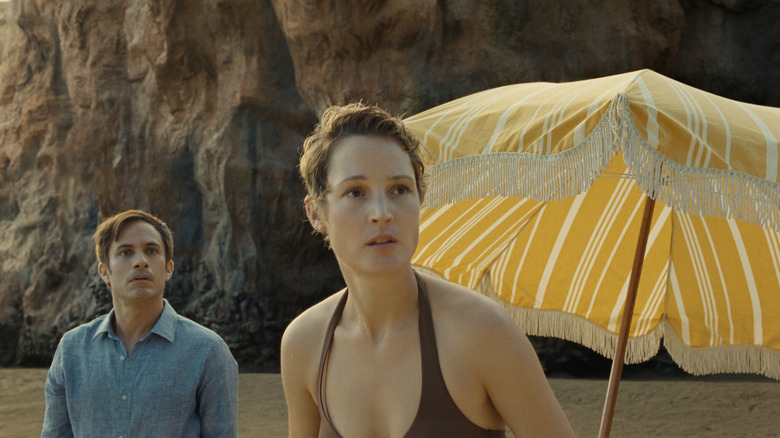Why M. Night Shyamalan Says He's Never Made A True Horror Film
Veteran filmmaker M. Night Shyamalan has conjured incredibly terrifying images in his darkly-skewed work, ranging from found footage frights to supernatural scares. Having effectively traumatized a generation with just one Brazilian birthday party-set jump-scare, many would argue that the Indian-born, Pennsylvania-raised director produces his best work when foraying into the horror genre. Yet according to the man himself, he wouldn't classify any of his films as horror. Of course, the narrative-bending director doesn't see things as being so clear-cut.
"I don't ever think I make horror," Shyamalan said during a video featurette from Universal Pictures ahead of the release of his most recent film, last summer's "Old." He defends this statement by elaborating on the idea that horror films generally feel like they're more about the destination, meanwhile his work has a more overt spiritual element embedded in its core. "This is meant for us to come out on the other side with a belief system stronger for it," he continues.
This claim definitely feels bold considering that the director's forthcoming project "Knock at the Cabin" —set for release February 3, 2023 via Universal Pictures — certainly teases an overt horror slant, though little has been revealed about the project's plot so far. That being said, let's dig into exactly what differentiates Shyamalan's "dark, disturbing" work from being branded as horror — at least according to him.
Taking inspiration from real-life experiences
Shyamalan emphasizes that his films are rooted in his own lived experiences, reflecting the mental and emotional state of the director at the time of helming each project. "'Unbreakable' represents where I was, and 'Split' represents where I was, and 'The Visit,' and you name it," he elaborates.
Particularly with "Old," Shyamalan notes that the idea for the film's premise was stoked by his own anxieties of his parents "getting very old." Now in his 50s, it makes sense for the director to turn his twisted filmic inclination toward the prospect of aging — a facet of his work that hasn't been this palpable since his career-revitalizing 2015 film "The Visit," which focuses on the relationship between two adolescents and their long-estranged grandparents who end up harboring terrifying secrets. Though "Old" feels more interested in dissecting our societal fear of aging as opposed to a general fear of elderly people, it also contains a stark streak of generational tension that feels similar to "The Visit" — though it's highly accelerated.
Rebirth and renewal
Having immigrated from India with his parents when he was six years old, Shyamalan was raised Hindu — and clearly the cyclical religious notion of samsara has deeply influenced his work, specifically when it comes to the idea of rebirth. Shyamalan notes that "the idea of being renewed is essential," especially when tackling his own cinematic pursuits. Having gained a reputation for mind-blowing twists and genre-breaking revelations, it's almost as if the director's signature style comes from constantly reinventing narrative conventions, always striving to "start over and come up with a new style."
What's particularly fascinating about Shyamalan's covert connection to the Hindu belief of reincarnation is that death often does not truly herald the end of a lifeform's existence on this mortal coil. Whether it be the ghostly apparitions in "The Sixth Sense" or ex-lunatics assuming murder victims' identities in "The Visit," it's clear that the physical body is not the only thing tethering humans to their Earthly selves. These stages of existence are infinitely intriguing, positing that human life is not the be-all and end-all of our existence, and that our corporeal forms only reveal so much to us about what it actually means to exist.
Most importantly, Shyamalan feels that it's imperative for audiences to watch his films and experience something completely new, always eager to offer up something original and thrillingly breath-taking. For the filmmaker, the greatest feat is creating a film and being guaranteed that a viewer will walk into the theater and "never have seen something like that before." His unyielding strive for producing new and novel films may have led to a few duds here and there, but you have to admit that his commitment to creativity is nothing short of admirable.
What makes a Shyamalan movie truly different
While some might argue that the director's obsession with plot twists and breaking the mold might be a formulaic approach in itself, what makes Shyamalan's films so intense is his insistence on testing the limitations of the human mind and body. Most notably during the writing process, the director says he tries to "imagine the very worst things" that people could possibly experience, ultimately questioning if he himself would be able to survive these situations both physically and emotionally intact. In fact, Shyamalan takes it one step further, often probing if he — and by proxy his characters — will actually be "stronger for that experience."
Clearly, the director is not only interested in testing the extremes of human turmoil, but also unpacking if experiencing worldly tribulations can result in a fortified mind and body. Once again evoking a sense of spirituality to this exploration, it's apparent that Shyamalan doesn't consider his films to be horror because he doesn't get off on watching humans suffer, but rather observing them thrive in the face of their perils. While themes of evil and darkness are certainly woven into the fabric of his films, these are merely portraits of a deeply flawed society — one that only a few brave renegades can combat and dismantle. Whether superheroes or a pair of film-obsessed kids, it's evident that those with tenacity and grit always persevere over those paralyzed into inaction.
Let this rest our case for M. Night Shyamalan's work being some of the best (or at least some of the most entertaining) in the game.



